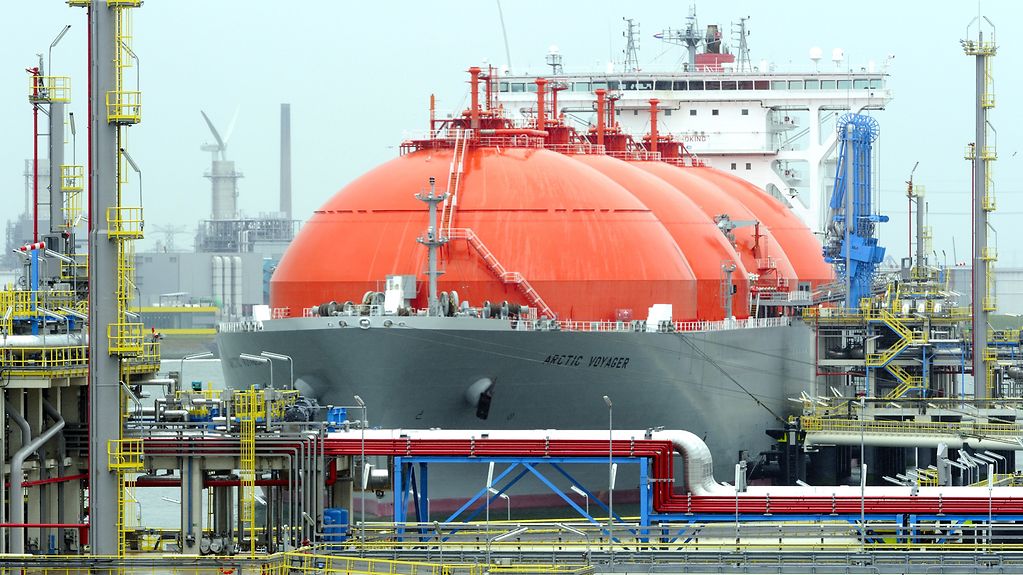LNG Acceleration Act
The Federal Government is working flat out to make Germany independent of Russian gas imports. Constructing liquefied natural gas terminals is intended help tap into alternative sources of supply for the short term. The Federal Cabinet has adopted a key resolution to this end.
3 Min. Lesedauer

Through the LNG Acceleration Act, the Federal Government aims to swiftly expand infrastructure for the import of liquefied natural gas.
Foto: picture alliance / dpa
What steps has the Federal Government taken?
The so-called LNG Acceleration Act came into force on 1 June. LNG is liquefied natural gas. It can be transported by ship to terminals, from where it can be fed into the gas supply network.
The Act proposes new regulations to allow for land-based and floating LNG terminals and the necessary connections to be constructed more quickly. This will involve swifter approval, tendering and review procedures. In order to help overcome the gas supply crisis, the Act creates exemptions to environmental impact assessments. Public consultation will continue to take place, albeit shortened to two weeks. This makes it possible to commence the construction of gas pipelines and infrastructure for LNG terminals as early as this summer. The Bundestag passed the Act on 19 May, and the Bundesrat confirmed the new regulations with its approval on 20 May.
Why is this law necessary?
Russia's illegal invasion of Ukraine has prompted the Federal Government to reassess the energy and security policy situation in Germany. Recent developments have shown that Russia can no longer be trusted as an energy supplier. Russia’s recent decision to suspend gas supplies to European partner nations makes it very clear how important it is to make Germany independent of Russian energy imports.
The LNG Acceleration Act serves this purpose. The Act is intended to increase security for national energy supplies by maintaining gas supplies from other countries. In order to do this, it is necessary to ensure LNG infrastructure is constructed swiftly. This infrastructure is essential for supply security in Germany. All the plans described in the law are in the overarching public interest and in the interests of public security.
Which LNG sites are planned?
The following locations are considered as being particularly suitable for bringing natural gas ashore: Brunsbüttel, Wilhelmshaven, Stade/Bützfleth, Hamburg/Moorburg, Rostock/Hafen and Lubmin. Which of these sites will be realised depends on a range of legal, technical and economic factors.
What steps has the Federal Government already taken?
The Federal Government and the federal state of Lower Saxony signed an agreement on 5 May 2022 to expand LNG and GreenGas infrastructure. At the same time, Federal Minister for Economic Affairs Robert Habeck signed contracts to lease four floating LNG terminals, with 2.94 billion euros of funding available to put them into operation. This is all part of efforts to broaden the base of Germany’s energy supply.
How is this law compatible with climate protection?
Fossil gas will only be relevant for a transitional period. For this reason the new gas power stations and infrastructure have been planned in such a way that they can be successively switched over to carbon-neutral products such as hydrogen. Building LNG infrastructure is a short-term solution to facilitate alternative ways of importing gas. From the very outset, the Federal Government has planned for this infrastructure to be suitable for use with hydrogen in future.
The draft LNG Acceleration Act includes provisions to ensure that land-based LNG terminals and the gas pipelines needed to connect them to the network will also be suitable for switching to hydrogen at a later stage. In this way the Act is in line with the climate protection targets set out in the Federal Climate Change Act. In accordance with German climate targets, the approvals for the LNG facilities are to be limited in duration to no later than 31 December 2043. Continued operation of these facilities will only be possible after that point if they are used for climate-neutral hydrogen and its derivatives. This ensures that it will still be possible to achieve the goal of climate neutrality by no later than 2045.